- Home
- Marge Piercy
Gone to Soldiers Page 10
Gone to Soldiers Read online
Page 10
“Relatives in Poland?”
“Some in Poland and more in France.”
Murray grinned. “I never knew any French Jews.”
“Two of my mother’s sisters moved to Paris. My mother came here from Poland and brought my grandma over.”
“My parents never talk about their family in Europe. They want so strongly to be all-American, they don’t even like to answer questions I ask.”
“They don’t ever talk Yiddish?”
“Never. I didn’t know they knew any until I heard my mother use it once in a store when she was bargaining about altering a coat.”
“I think it’s important to have a sense of where we come from.” She would not say anything about Naomi yet, who made real and vivid to her all the relatives she had never met. Naomi had not spoken to Murray, and in the bustle and chaos of her home, he had probably missed the little girl with frizzy hair and hazel eyes and heart-shaped face like a valentine cat glaring at him.
“I don’t know.” Murray frowned. “I see those Hasidic guys sometimes in the curls, dressed peculiar, and I can’t identify with them any more than with a bunch of Eskimo or South Sea Islanders. I feel like they’re from the Middle Ages. I’m living in Detroit in 1941, and they’re still living in Minsk in 1841. I feel embarrassed for them.”
“But there’s a connection. I’m just as much of a Jew as they are, but in my own way. That’s what I learned from my grandmother and my mother, and that’s what I want to pass on.”
“Do you think a lot about getting married?”
Ruthie laughed sharply. “Oh, Murray, all us kids who grew up during the Depression, do you know anybody expecting to get married real young and start a family? Not those of us who want anything more than our parents have. I see it with my brother Arty and his wife Sharon, how it keeps them down to have two children already. I don’t care if Arty tells me I’m going to be an old maid, I don’t want to get married and have children till I’m twenty-five or maybe even thirty!”
“That’s good, I mean, that’s farsighted of you. I bet you’ll get your degree. Ruthie, I don’t know what to do. On one hand, I want to stay in school real bad. I figure it’s my only chance to get ahead and be in a real profession. The kind of jobs open to me now, the moment the economy slumps, you’re on the streets. I want to do work I respect. Likewise I feel I should go down and enlist. This is my country and guys are getting shot already. Besides, I’d probably get a better deal if I enlist, instead of waiting for them to draft me. What do you think?”
“I don’t think I ought to tell you, but I’ll respect your decision. Why don’t you wait till the end of the week? All the hotheads are going to rush down there as soon as they get out of bed. Why not wait and see what President Roosevelt does? I heard a commentator say that maybe there would just be a naval blockade.”
“I’ll wait till I see what’s really happening. I can always enlist next week. I’ll hold on and keep plugging away.” He stopped in the middle of the sidewalk, leaning over her. Before she had time to formulate a decision, he kissed her, then let her go. They walked on. “Would you rather have a soda or coffee? Do you want a piece of pie or ice cream?”
“In spite of the cold, I’d like an ice-cream soda.” She did not bother explaining to him that coffee they always had on the stove, but that an ice-cream soda was something she had last enjoyed in August.
She felt cheated that he had kissed her so quickly, so calmly, so matter-of-factly, that she had had no time to prepare, to haggle over the decision. He was now a man she had kissed, one on a list of four, which had been a list of three till five minutes ago. It had been over too fast. From years of watching movie kisses, she expected great emotion from a kiss with a man she was attracted to. Now he might suddenly go off to war, and she would have gotten no satisfaction or substantial memories out of someone who comprised one quarter of her experience with men. She could only hope that after their sodas, when he took her back home, he would do it again, but please not on the porch under the light, where everybody in her family would spy through the window.
At the Yenching Institute, Pearl Harbor barely interrupted their studies. Daniel was rushed to the navy yard in Charlestown along with all the rest of his companions in the program who had been until this day civilians. They were given a fast induction. Clearly the doctors had received special instructions about them, because nobody was turned down, no matter what age or shape they were in. Then they were bused right back to their courses. They did not even lose a whole day entering the Navy.
He had heard enough tales of atrocities on the part of the Nazis in Europe and of the Japanese in China to make the necessity for the war real enough to him. Nonetheless he felt strange, as they were fitted for uniforms. He was a sailor whose only knowledge of ships had been gained as a passenger crossing the Pacific. Suddenly he was Ensign Balaban. He felt fraudulent in his new uniform.
What astonished him was that the Navy had allowed itself to be surprised, when surely the situation in the Pacific had been building steadily toward war. One view he sometimes held was that war had been developing since American warships had forced Japan open under Admiral Perry in 1854; a more reasonable view would maintain that the oil embargo rendered war inevitable. The Navy must have observed the Japanese army in action in China, and still they did not credit them with being a powerful modern machine of war. They just had not believed the Japanese would attack them, because they were white and the Japanese were not, and because they thought of themselves as being six feet tall and the Japanese as being short, and short men do not usually take on tall men in hand-to-hand combat. Somewhere in the mythology of defense that formed how military men thought, he had observed already, such primitive thinking had pride of place at times.
He was worried about Uncle Nat Balaban in Shanghai, with news of the Japanese shelling the city and marching into the International Settlement; but Uncle Nat had lived in Hongkew, known as Little Tokyo for years. He had always paid off whoever had to be paid off, all sides, all factions, bowing to everybody. Daniel thought his uncle’s chances of survival decent. He had less idea about his own. Surely they were going to give him some kind of sea training, yet that did not seem to be in the works. He might be assigned to a ship with a very good knowledge of Japanese and unable to tell bow from stern, once again the butt of every joke, the odd man out.
Now this was a whole other war, Naomi thought, pointing the wrong way. She felt like hitting the radio and kicking all the adults of the world, who seemed determined to ruin everything with their wars. She had thought if they were going to have a war here that they’d have the same one her parents were caught in, but now a whole other one seemed to be starting with the Japanese, who were over that strange other ocean that used up so much of the blue on the globe.
She left the living room where the radio was booming to lie on Ruthie’s bunk, which smelled of lilac perfume. She pressed her cheek into Boston Blackie’s warm flank. Somewhere Maman and Rivka were listening to their little radio and hearing about this attack and worrying about her. Somewhere in the south of France Papa was listening too.
Clutching Boston Blackie, she wondered if it would start here, how it was when the Germans came. Soon when Maman went into the épicerie, the shopkeeper would not recognize her, would only wait on her last. The neighbors looked away from Naomi on the stairs as she raced up before the light turned itself off; people spat in the street; her friend Agathe would no longer play with her after school, because her father had forbidden it. At any moment the world could change toward you, and those you had always called your friends walked away from you and left you alone standing in the schoolyard. Then you moved closer to the other Jews, even tall gawky Yvette, and you and Rivka held hands and stood together with the other Jewish children, awaiting what the others would try to do to you now.
She heard steps and Ruthie’s arm came gently around her shoulder. “Naomi, what’s wrong? Are you frightened?”
She nodded
.
Ruthie gathered her up suddenly in a fierce hug. “I’m scared too, Naomi. I’m terrified.”
Naomi hugged Ruthie back and suddenly she was flooded by a fierce love for her aunt who was not really her aunt but her cousin. Something tore loose in her and for a moment she felt guilty before Maman and Papa and Rivka and Jacqueline, that she should begin to love somebody else. Would she ever see them again? Ever? She had not seen Maman and Rivka since May and she had not seen Papa since June.
All these wars cut up the world into bleeding pieces and nobody could cross over. But she would love Ruthie. Maybe after the war, if there was ever an after, she would take Ruthie back with her, and Ruthie would live with them too. “Comme elle est belle, avec ses yeux très verts, et sympathique aussi. Tu as de la chance, petite.” Maman’s rich lilting voice spoke in her ear, the voice that had laughter deep in it always like veins of dark swirls in light marble. She held Ruthie more tightly. She held on.
JACQUELINE 2
Of Chilblains and Rotten Rutabagas
22 août 1941
This will be a brief entry, as I have had no sleep for the last two nights. We all went into the country near Fontainebleau with Papa’s old copain Georges to buy up what food we could at two farms where Georges knows the people. It was hot and Maman was off work, so we decided to make almost a vacation of it. The train was extremely crowded with others doing exactly the same thing, carrying a maximum of bags and knapsacks which we all planned to try to buy food to fill. Bean or potato trains they call them.
These days nobody but the Germans and those who cater to them and flatter them and serve them are the least bit elegant. In winter we all waddle around in as many layers of sweater and shawl and cardigans and socks as we can cram on, because we lack fuel, all increasingly shabby because of the shortage of clothing, which is rationed and mainly not available (to us; the Germans and their collaborators glitter). All times of the year we go about Paris carrying empty bags, prepared for hours in line for a handful of old beans or a jar of jam. Nobody drives except the Germans. Bicycles are the lifeline and if your tire goes, you must mend it to survive. So people stood in the mobbed train eyeing each other and wondering what edibles each of us was off to scavenge and what we were trading. We had a couple pieces of soap and a piece of somewhat ratty but still quite warm beaver that any clever housewife could make into a muff or use to trim a coat, and a pair of good wool pants of Papa’s, which we feel bad about trading but we are afraid moths will eat them. Who knows when we will see Papa? In May he bought an Ausweis in a dead man’s name to go into the unoccupied zone and thus get one of us to America through Marseille. I refused to go because I was studying for my bac, which I passed with flying colors. Papa took Nadine instead, and we have not laid eyes on him since, although we hear from her regularly.
When we came back today, we found utter confusion. While we were gone, the Nazis closed off the entire XIe arrondissement, shut down the Métro stations and moved in. They arrested Jews on the streets, in cafés and restaurants, waiting in line—which is all we do from one day to the next—and even in their homes. The Balabans are gone without a trace. For two days I have been running around Paris for Maman, who has been crying and crying, trying to find out what happened to them.
24 août 1941
Today I learned the Balabans are in some sort of camp at Drancy, a railroad town just a few miles outside Paris. Maman is greatly relieved to find out where they are. We must see them and ask what they need. Their apartment is a shambles, everything thrown on the floor and ripped open. Neighbors say the police did it. If they were looking for the legendary riches those sort always seem to think Jews have, they searched in vain, because the Balabans owned hardly more than the clothes on their backs and some rickety fourth-hand furniture.
26 août 1941
Things get uglier. Just a little over a week ago there was fighting between demonstrators and police—both the gendarmes and the German police—at porte Saint-Denis and porte Saint-Martin, and they arrested a lot of people even though it was no different from a hundred other demonstrations everybody who has lived in Paris through the last ten years takes for granted! Anyhow, the Germans went ahead and executed two people they had arrested. One they are making a great fuss about because he is Jewish and they list him in big letters on all the posters as THE JEW SAMUEL TYZELMAN.
Henri says it is just the Nazi madness and people will begin to laugh at them and mass disobedience will result, but I find his attitude too optimistic for me these days. He brought me a beautiful present today—five kilos of potatoes and a little piece of mutton. Maman was in ecstasy although of course her second question was, Are you sleeping with him? If I were, Maman, I said, perhaps he would have given me a bigger piece of mutton! She made as if to slap me, but then she did not, because in truth she was too happy about the mutton and the potatoes too.
His mother’s brother has a farm 25 kilometers north, so he bicycled out there on Saturday and back on Sunday loaded down with parcels. We had such a feast tonight and Maman is going to stretch it over the next two nights. It is so long since we have had anything except cattle fodder and herbal extractions and a few rotten vegetables cooked for soup, beans beans beans beans beans and an occasional thin slice of cheese washed down with ersatz coffee and tisanes. Every so often one egg apiece.
Last month we had used up our bread allowance by the twelfth and even trying so hard this month, we ran out by the seventeenth. We would exhaust it sooner but we all scrounge whatever we can, and my copains, the gang at the café Le Jazz Hot, treat me almost every day. Most of them have decent black market connections. Of course it is much easier if you aren’t a Jew, but I can’t complain, because they share with me.
I am writing this tonight on a full belly, and it is amazing how strong and alert I feel. Right after we ate I almost dozed off. We sat around the salle à manger, Maman, Renée and I, and beamed at each other. We felt peaceful as cows in a field, yet I could not be ashamed that my bliss was built on having for once a well-filled stomach, because I have learned how difficult it is to concentrate on an empty one.
It is also cheering to know we shall not be hungry tomorrow or the next day. I can face the problems of our lives less on my nerves, with a solider strength. I did not know if I enjoyed the lamb more or the potatoes. Even the rutabagas we loathe and eat every day tasted almost like food in the stew. Last week Céleste sold me a bag of carrots that must have weighed at least two kilos. Maman still had two of them left for our grand stew.
Most of our lives are spent standing in lines. Maman still has her job at the furrier’s even though the firm has been taken away from M. Cariot. They are seizing all the Jewish businesses. The man who has taken it over did not fire the Jews, as expected, because he says how is he supposed to run a skilled business with no skilled workers? Maman says we are very lucky. Renée and I do most of the waiting in line, but I do better because I am bigger, while Renée gets pushed out of the way. I have learned to study standing and in fact that is where I do most of my reading.
Anyhow the Germans have announced that everybody arrested no matter for what—and at least over half the people arrested are merely people who get caught out after curfew—are going to be treated as hostages. You get involved and miss the last 11 P.M. Métro, and then you are out of luck if a friend is not kind enough to let you stay over, as Céleste has let me stay several times, and Henri and Albert like gentlemen once. Henri and Albert live right up the hill from the Sorbonne, in a dirty little side street but convenient. Maman hits the ceiling when I stay out. I don’t do it intentionally, but occasionally everybody misses that last Métro. This decree means that if you get caught at some minor infraction, then they may take you out and shoot you one morning because some hothead has taken a potshot at a German officer. I do not understand what the Germans expect to accomplish by this brutality. Do they think when some poor dishwasher in a restaurant who misses her train is shot for an action one of the new re
sistance groups takes, that the Gaullists or the Communists are going to fold up and wither away?
I almost forgot, somebody else has moved into the Balabans’ already. They have thrown the Balabans’ pitiful things out into the street for the neighbors to pick through, but held on to their kitchen table and chairs. When the Balabans come back, I don’t know what they will do. I only hope Maman is not carried away by fellow feeling into taking them in. Without Papa’s income we have let go of my room on the top floor. Renée and Maman share her double bed and I sleep on the folding bed in the salle à manger.
8 septembre 1941
I was coming from my acting class when I had to pass along the boulevard des Italiens. I was wrapped up in thinking about the character of Bérénice in Racine’s great tragedy, with whom in some ways I can easily identify myself, when I saw a great crowd of people ahead lined up to enter the Palais Berlitz.
“Oh, what’s that? Is there an exhibition?” I asked a middle-aged woman. I am always careful to ask information on the street from women, since I would not want to give an opening to some man who might imagine I am trying to pick him up. I still remember that idiot boy who followed me all the way to Marie Charlotte’s flat just because I answered his question and told him which way the Gare du Nord was. Now I understand he perfectly well knew. Henri says I am definitely naive about men, but the truth is I have other worries and do not need more.
“It’s a big exhibition, everyone’s going,” she said, nodding at me. “It’s ‘The Jew and France.’ You ought to go too. You aren’t too young to face facts.”
I thought at first she meant that as a Jew I should understand anti-Semitism, but then she went on: “You have to keep yourself pure, a young girl such as yourself, but you must understand contamination too. It’s a matter of educating one’s self for the New France.”

 Woman on the Edge of Time
Woman on the Edge of Time The Cost of Lunch, Etc.: Short Stories
The Cost of Lunch, Etc.: Short Stories Made in Detroit: Poems
Made in Detroit: Poems Sleeping With Cats
Sleeping With Cats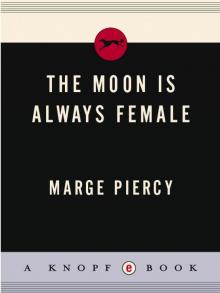 Moon Is Always Female
Moon Is Always Female The Longings of Women
The Longings of Women Circles on the Water
Circles on the Water Summer People
Summer People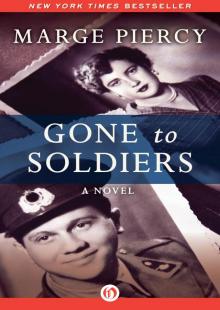 Gone to Soldiers: A Novel
Gone to Soldiers: A Novel The Hunger Moon: New and Selected Poems, 1980-2010
The Hunger Moon: New and Selected Poems, 1980-2010 Vida
Vida Fly Away Home
Fly Away Home He, She and It
He, She and It So You Want to Write
So You Want to Write Small Changes
Small Changes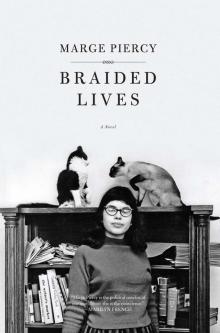 Braided Lives
Braided Lives Lord Valentine's Castle
Lord Valentine's Castle Dance the Eagle to Sleep
Dance the Eagle to Sleep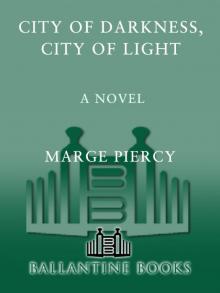 City of Darkness, City of Light
City of Darkness, City of Light The High Cost of Living: A Novel
The High Cost of Living: A Novel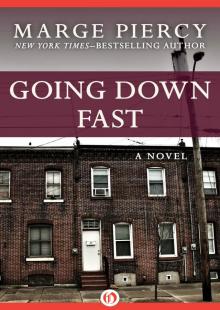 Going Down Fast: A Novel
Going Down Fast: A Novel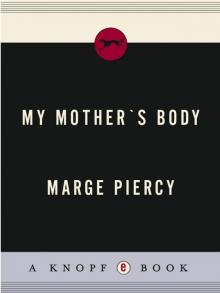 My Mother's Body
My Mother's Body Storm Tide
Storm Tide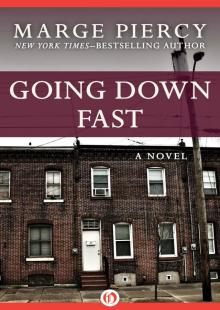 Going Down Fast
Going Down Fast The Third Child
The Third Child The Hunger Moon
The Hunger Moon The Cost of Lunch, Etc.
The Cost of Lunch, Etc. Sex Wars
Sex Wars The High Cost of Living
The High Cost of Living Made in Detroit
Made in Detroit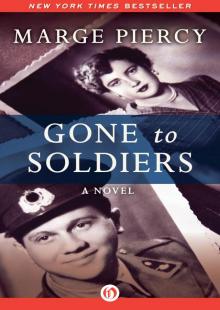 Gone to Soldiers
Gone to Soldiers